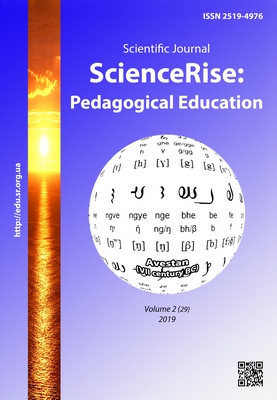Modeling of professional activities of future teachers in master training conditions
DOI:
https://doi.org/10.15587/2519-4984.2019.161580Keywords:
modeling, professional activity of the teacher, training of future teachers, model of specialist, model of teacher activityAbstract
The article describes the state of the problem under study on scientific and pedagogical literature and normative documents, specifies the essence of the key concepts of the research, specifies the peculiarities of preparation of future teachers for the professional activity in the conditions of the master's degree.
The peculiarities of preparation of future teachers for the professional activity in the conditions of the magistracy through its modeling are substantiated. It is noted, that simulation of the process of professional training for the activities of future teachers provides the basis for answering the question: how to build a learning process, in order to increase the qualities of the personality of the teacher of higher education, sufficient for professional activities. Principal significance is the question of the essence of the profession of a teacher of higher education, the content and competence of his/her duties, the culture of his/her pedagogical influence, his/her values and ideals, and professionalism.
It is determined, that preparation of future teachers for the professional activity in the conditions of the magistracy is a process of organization of educational, scientific and pedagogical activity of a master student during his/her studies in the magistracy, aimed at forming his/her readiness for the activity of a teacher of higher education. The purpose of preparing future teachers for the professional activity in the conditions of the magistracy is to form the personality of the future specialist, to ensure his/her professional development and pedagogical skills, professional competence, professionally significant qualities, as well as the ability to carry out a scientific research.
The model of preparation of future teachers for the professional activity in the conditions of the master's degree based on the implementation of organizational and methodical conditions is presented
References
- Pro vyshchu osvitu (2014). Zakon Ukrainy No. 1556-VII. 01.07.2014. Available at: https://zakon.rada.gov.ua/laws/show/1556-18
- Pro osvitu (2017). Zakon Ukrainy No. 2145-VIII. 05.09.2017. Available at: http://zakon.rada.gov.ua/laws/show/2145-19
- Batechko, N. H.; Tsekhmister, Ya. V. (Ed.) (2014). Pidhotovka vykladachiv vyshchoi shkoly v umovakh mahistratury: teoretyko-metodolohichni zasady. Kyiv: Edelveis, 708.
- Briukhanova, N. O., Korolova, N. V. (2015). Osoblyvosti modeliuvannia profesiinoi pidhotovky fakhivtsiv. Profesiina osvita: metodolohiia, teoriia ta tekhnolohii, 2, 21–34
- Klokar, N. (2008). Andrahohichna model pidvyshchennia kvalifikatsii pedahohiv na zasadakh dyferentsiiovanoho pidkhodu. Pisliadyplomna osvita v Ukraini, 2, 23–28.
- Lodatko, Ye. O. (2010). Modeliuvannia v pedahohitsi: tochky vidliku. Pedahohichna nauka: istoriia, teoriia, praktyka, tendentsii rozvytku, 1. Available at: http://intellect-invest.org.ua/pedagog_editions_e-magazine_pedagogical_science_vypuski_n1_2010_st_2/
- Vykorystannia interaktyvnykh metodiv ta multymediinykh zasobiv u pidhotovtsi pedahoha (2003). Kamianets-Podilskyi: Abetka-NOVA, 208.
- Nychkalo, N. H. (Ed.) (2000). Profesiina osvita: slovnyk. Kyiv, 380.
- Sabatovska, I. S., Kaidalova, L. H. (2014). Modeliuvannia diialnosti fakhivtsia. Kharkiv: V-vo NFaU, 180.
- Stoliarenko, O. V. (2015). Modeliuvannia pedahohichnoi diialnosti u pidhotovtsi fakhivtsia. Vinnytsia: TOV «Nilan-LTD», 196.
- Short, E. C. (Ed.) (1997). Competence: Inguires into its Meanning & Acguisition in Educational Settings. New York: Univ. Prese of America, 84–185.
- Garavan, T. N., McGuire, D. (2001). Competencies and workplace learning: some reflections on the rhetoric and the reality. Journal of Workplace Learning, 13 (4), 144–164. doi: http://doi.org/10.1108/13665620110391097
Downloads
Published
How to Cite
Issue
Section
License
Copyright (c) 2019 Inna Sabatovska, Sergey Bobokalo

This work is licensed under a Creative Commons Attribution 4.0 International License.
Our journal abides by the Creative Commons CC BY copyright rights and permissions for open access journals.
Authors, who are published in this journal, agree to the following conditions:
1. The authors reserve the right to authorship of the work and pass the first publication right of this work to the journal under the terms of a Creative Commons CC BY, which allows others to freely distribute the published research with the obligatory reference to the authors of the original work and the first publication of the work in this journal.
2. The authors have the right to conclude separate supplement agreements that relate to non-exclusive work distribution in the form in which it has been published by the journal (for example, to upload the work to the online storage of the journal or publish it as part of a monograph), provided that the reference to the first publication of the work in this journal is included.







